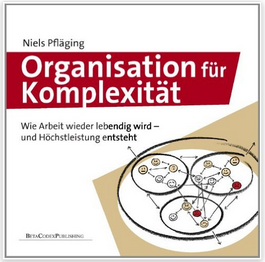Change Management: Organisation for Complexity
“When Pfläging shakes up the dogmas of management, they crumble in his hands“ - quoting the Financial Times Germany, back when it still existed. If only one they had listened to Pfläging, one could assume that it would still exist. He - Pfläging - has written a new book on the subject of change management: Organisation for Complexity. Actually, it is not really new, it merely summarises his well-known theses in a clear and compound manner.
Theses on the end of management in its conventional form. Pfläging and the “Beyond Budgeting Round Table“ call them alpha-companies.
Alpha means: “Management by objectives“, budgets, plans, remuneration according to position, incentives, bonuses, maximisation obsession and cost management. Beta means: Transparency, team targets, target comparisons with the average of the sector, consequent financial participation and network organisation.

The small booklet is divided in 7 chapters, the subject of complexity runs through them like a read thread. Starting with basic considerations on the effect of complexity on people in organisations over self-controlled teams, successful leadership, up to the development of dynamic-robust networks and the transformation into beta-companies.
The origins of this concept go back to a work group founded by Robin Fraser, Jeremy Hope and Peter Bunce, the so-called “Beyond Budgeting Round Table“. They see themselves as an interest group, that propagate a new organisation approach based on scientific findings and above all they consider themselves to be an antagonism of the Tayloristic view of “instruction and inspection“. Svenska Handelsbanken, W.L. Gore, the Brasilian Semco, Southwest Airlines, Toyota, but also dm-drogerie markt or Aldi in Germany are considered to be important pioneering enterprises.
Back to the book: For all those that want to get newly acquainted with this subject the book can merely serve as an appetizer, leaving a lot of questions open. As background information we can recommend for the German-speaking regions the books by Pfläging und Gerhard Wohland. For all those that have been dealing with such approaches for some time already, it represents a successful summary. Desirable for the future would be a concrete description written by companies that have successfully managed a transformation from alpha to beta.

